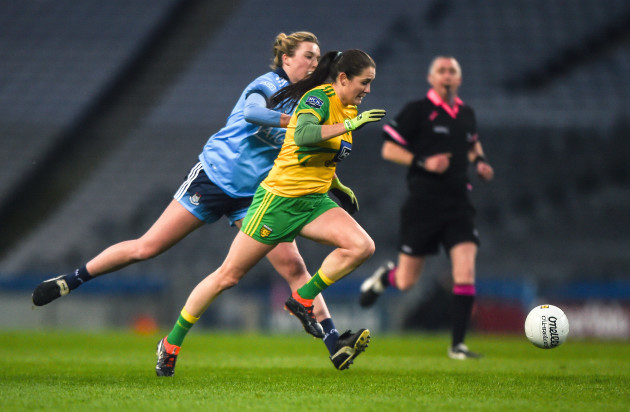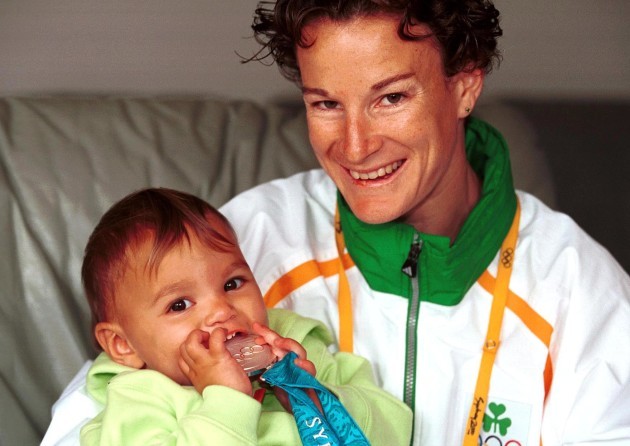DONEGAL FOOTBALLER KATY Herron just wanted to disappear when she got the news, away from the busy tongues of small town Ireland and what they might be saying about her.
Close friends had already heard before speaking to her about it.
Feelings of guilt and disappointment come to mind when she recalls her immediate reaction to what was before her at the age of 22.
Herron didn’t have any teammates who could relate to her situation. She presumed, like many others, that this chapter of a woman’s life could, and should, only happen after their days in sport were over.
How would she manage? Would this mark the end of her inter-county career ? Had she ruined her own illusion of what the perfect family dynamic should look like?
These were the questions tormenting the Glenfin native who was in her final year of college, and had only just broken into the Donegal senior team.
This, of course, was not the end for Herron. She would go on to captain her county, and later enjoy a season in the AFLW with the Western Bulldogs.
But there was no space in her head to even contemplate those kind of possibilities at the time.
For Irish Olympic legend Sonia O’Sullivan, hearing the news meant whipping out the calendar and doing the maths. It was coming towards the end of 1998, with the Sydney Olympics on the horizon in 2000.
How would this nine-month journey align with her training regime? What was the best and safest way to keep everything going while accounting for a second heartbeat in her body?
O’Sullivan spoke to a doctor who encouraged her to keep training as normal. This, as it turned out, was something she was able to do right up to the end.
And on 10 July 1999, Ciara O’Sullivan made her safe arrival to the world.
****
There are several examples of athletes returning to high-level sport after pregnancy. Serena Williams, Briege Corkery and Paula Radcliffe are among the names that come to mind.
More recently, 11-time All-Ireland winner Bríd Stack signed a contract with AFLW side Greater Western Sydney Giants last year after giving birth to her son, Cárthach Óg.
There is some science that explains why female athletes can make successful comebacks from such a physically demanding experience. Increases in their blood volume and a stronger musculoskeletal system during the pregnancy are big enablers for their return.
Staying in training while pregnant is another factor that helps athletes get back to their best.
Strength and conditioning coach Colin O’Shaugnessy has trained with plenty of pregnant women at his Cork-based gym, Elite Fitness. Cork legend Stack is among the many clients he has assisted in making that transition back to sport after having a baby.
He explains the importance of continuous training for mother athletes to The42.
“I have women who trained right up to the day before the birth. The longer you take off, the longer it’s going to take for you to come back. So, the fitter you stay, the better.
“The majority of pregnant women who work with me, who don’t have any complications, would train right up to the week of giving birth. And that makes it much quicker for them to come back.
“If you stop training when you’re four months pregnant, you take five months off and then you have the baby. There’s obviously a delay and then it becomes six, seven or eight months [and] it’s a bigger hill to climb then.
“You hear people say, ‘Oh if you’re pregnant, you mustn’t do anything for months.’ Like, everybody’s different. If you’re a naturally fit person, you can come back quite fast. If you’re a person who’s never trained, obviously it’s going to take you a lot longer after you give birth because it’s such a shock on the body.”
This was how O’Sullivan approached her pregnancy with Ciara.
“Um… not really, no,” is her response when asked if she ever took a complete rest before giving birth. Naturally, her training load was less strenuous and she started opting for power walking to ease things off even further.
She adopted a similar approach when she became pregnant with her second daughter, Sophie. And on that occasion, O’Sullivan was actually in the gym on the day Sophie was born in 2001.
“I had been doing spinning classes during the week but this Saturday,” she recalls. “I went into the gym in the morning and I was just going to do a gym session. I remember doing these exercises and thinking, ‘I don’t feel quite right here.’
“I came back and we were going to go out for breakfast but I just wasn’t up for it so I knew there was something not quite right but I was so relieved that I’d got in that last gym session in the morning, thinking, ‘Well, I haven’t missed a day here.’”
It was slightly different for Herron. She didn’t train all the way through her pregnancy with Joshua. Given the levels of physical contact involved in Gaelic football, it would have been tricky to keep playing.
Herron, however, managed to keep lining out for her club Glenfin until she was in the third month of her pregnancy.
“We actually got to the Ulster final for our club that year, and it was the first time, so I actually played that game three months pregnant. I did get advice from the doctor and he said it was fine. I was playing full-back at the time and he was like, ‘As long as you’re the one doing the hitting and not getting hit.’
“We got beaten in that game, which was probably a blessing because I would have wanted to play on. I eased off then and probably wouldn’t have done a lot of exercise then, walking maybe and cycling.
“People are a lot more active now and there’s a lot more research out there of what’s safe to do and what’s not. For me being so young, I probably didn’t have access or seek any of that kind of advice.”
****
O’Sullivan took small steps to regaining her full fitness after Ciara was born. She started with some jogging and walking before returning to the track for her first running session about a month later.
She ran with the slower group that night and packed in a few runs in the week that followed. By the time her second session came around, there were already notable improvements in her output.
And it all culminated in that famous silver medal at the Sydney Olympics the following year.
“The difference was amazing,” she begins when talking about the early days of her postpartum training.
“I improved so much just in that short amount of time. I think that rapid improvement back towards a normal level of running gave me great motivation. It kind of gave me a boost every week that you were quite happy to get out and do all the other runs during the week, and different training, and test yourself at the track every Tuesday night.
“It only took around three or four weeks to get back training at my normal level again.
“I came back pretty fast and I think I ran a world record in Loughrea 12 weeks after she was born.”
Herron capped off her 2014 season with the Donegal Player of the Year award, and reckons that 2015 was her best year in the county jersey.
Progress was slow at the start. She played her first club championship game about six weeks after Joshua was born, a comeback that she suspects was a bit too early for her. Her sister bluntly told her as much.
“I had a lot of issues after that with my lower back and my pelvis being out of line and stuff, which probably did come from that. It was probably that my core wasn’t stable enough at the time.
“But when it comes to a championship match, you don’t really listen to your body too well. I thought I was going grand, but talking to my sister she said, ‘You were literally in slow motion.’
“I was like, ‘I wasn’t that bad,’” Herron laughs.
“I wasn’t able to get to training as much so I did a lot of work at home myself to try and get myself in shape for the county season again. There was a lot of individual stuff there.
“At the time, I thought I was at my fittest before I got pregnant and I wanted to get back to that stage again. But looking back, I’ve come so far from then that I probably wasn’t fit at all at the time.
“I don’t know if it’s a mentality thing of having Joshua but I’ve driven myself a lot harder since that, to get myself back up to the top level.”
Psychological motivation plays a major role in all this, according to O’Shaughnessy, and the relief of knowing that sport doesn’t have to end after the birth of a child.
“A lot of them might feel it’s their last chance or a second chance, and maybe it makes them work harder,” he says. “Physiologically, there should be no real issue. The body is designed to give birth and come back just as strong because the world needs strong mothers to raise children.
“There’s no reason for you to be slower or less strong. I would think that mothers are great because they get that second chance and work that little bit harder.”
O’Sullivan wasn’t burdened by any fear of harming the baby while she was training, and Herron felt confident about playing football in the early months of her pregnancy.
Similarly to Herron, there were few female track athletes she could turn to for advice. Great Britain’s Liz McColgan was one such example that she spoke to about how to balance it all, and still come back to elite level competition.
But it’s not uncommon for pregnant athletes to worry about the training that they’re doing, and O’Shaughnessy is sensitive to those concerns.
“Absolutely. There’d be certain exercises that we’d rule out. It comes back to the safe environment. I think once they feel that you’re pushing them hard but in a safe environment, they know they can work hard in certain things and pull back in certain areas.
“You wouldn’t have them box jumping for example but you can still do lots of hard stuff. You wouldn’t have people running as much or we’d have people on bikes where they’re in a safe place or they can’t fall off or hurt themselves.
“We can push them hard in certain safe parameters.”
****
Balancing your sporting commitments with your maternal obligations brings plenty of challenges. Arranging a babysitter isn’t always possible, and becoming efficient with time-management is a key requirement to keeping all the balls in the air.
O’Sullivan recalls one experience when she tried to do it all herself. She had baby Ciara in a push pram and attempted to go out for a short run. But little Ciara wasn’t a willing passenger, and O’Sullivan soon had to surrender as her daughter “just screamed the whole way”.
Herron had plenty of support from her family in helping to raise Joshua. Her teammates were a huge help as well whenever Joshua was brought to training and needed a minder.
But there were testing moments too.
She remembers one morning when she was preparing for a 6am training session with Donegal, which was arranged by a new manager who wanted to test the mental resolve of the players he was working with.
Herron had booked her brother in for babysitting duties while her mother was away. Everything seemed to be lined up perfectly, until the morning of the session arrived.
“Of course, Joshua woke the house and tensions were high,” says Herron, taking up the story.
“I just said, ‘Oh I’ll just take him.’ I remember everyone was like, ‘That poor child.’ He was standing at the side of the field half sleeping and I had dragged him to training with me.
“There were just times when you had to do things like that.”
Their biggest challenge and biggest adventure was to follow. On the back of helping Donegal to an Ulster three-in-a-row, Herron was presented with a deal to play in the AFLW in 2020. The Western Bulldogs wanted her signature as the path into professional sport lay before her.
A massive opportunity, but one that she had to give a lot of thought to. Fitting Joshua into the plan was the main priority for her. Now a qualified teacher, Herron was able to bring Joshua with her and decided to home-school him during their time away.
It turned out to be a great move for the pair.
“He was brilliant,” says Herron about Joshua’s adjustment to life Down Under.
“He was so happy being able to do his own thing and probably having me around more. At home, life was so busy and I was going to work, getting the dinner, homework done and then leave for training.
“The amount of time I spent with him at home compared to when we were in Australia was massive. He was just so grateful to have all this time with me that it didn’t kind of faze him at all.
“We did the schoolwork in the morning and headed to the beach or went for a cycle. There was so much freedom and so much there for kids. There was no real homesickness at all. My family came over as well so we always had someone to look forward to coming.”
The contrast between life before and after Joshua was born is huge for Herron. She’s certain that much of what she has achieved in sport has been inspired by him. One of her teammates even remarked to her that she has become a better footballer since having Joshua.
Her mindset now is a world away from the one she had when she first discovered she was pregnant, when the outlook she had for herself was bleak and narrow.
It’s only in recent times, when she got involved in a leadership programme through the LGFA, that she started talking openly about that dark period in her life. Working as an athlete mentor, she was able to go to schools and share her story with teachers and students.
“It was just something I had never been able to open up about. It was always something I kind of held against myself, or that I felt a guilt in myself for letting it happen.
“Finding out, at the time, was probably the worst moment of my life. I get quite emotional talking about. Even when I’d be going around the schools, I’d be crying. It’s just something I clung onto for so long.
“It was a massive shock, a huge disappointment for everybody. It was something at the time that I didn’t think I was going to manage. I knew I would have the support of my family but it was just that feeling of disappointment that I knew my parents, and I had in myself.
“It was a pretty tough time, and it was before I was going back to Liverpool [where Herron was attending college] and I wanted nothing more than to get out of the country and get away. You know what small towns are like, and in my head, everyone in my head was talking about me. It was just something I needed to get away from.
“When you’re growing up, you have this idea in your head of a perfect life and a perfect family. To me, I had messed that up. The older you get, you realise [that] perfect’s what you make it.”
That sense of fear gradually gave way to hope. Her football career came back off the pause button in time as well, with Joshua going along with her stride for stride. They’ve found their own way of making it work.
Each individual is different of course, but every female athlete can make it work. O’Sullivan feels that the best way to strike a healthy balance between motherhood and sport is by compartmentalising your life.
“It’s like going to work, you just have to separate it. When training becomes work, and when you’re at work then you focus on that. The better you focus on it, the better you can do it and the quicker you’re finished.
“You can be back busy being a mum again.”





